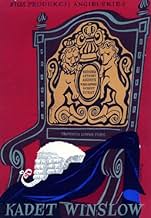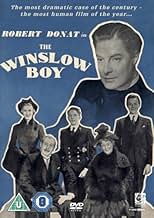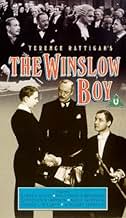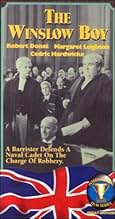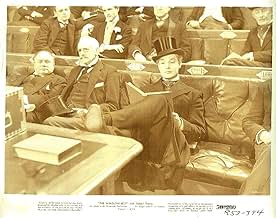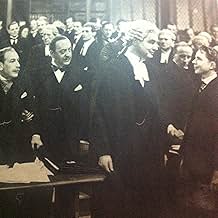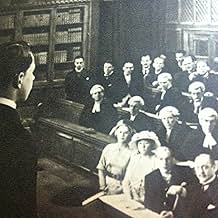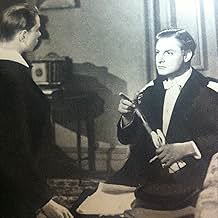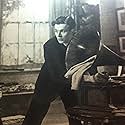NOTE IMDb
7,6/10
2 k
MA NOTE
Ajouter une intrigue dans votre langueIn pre-WWI England, a youngster is expelled from a naval academy over a petty theft, and his parents raise a political furor by demanding a trial.In pre-WWI England, a youngster is expelled from a naval academy over a petty theft, and his parents raise a political furor by demanding a trial.In pre-WWI England, a youngster is expelled from a naval academy over a petty theft, and his parents raise a political furor by demanding a trial.
- Réalisation
- Scénario
- Casting principal
- Nomination aux 1 BAFTA Award
- 1 victoire et 2 nominations au total
Cedric Hardwicke
- Arthur Winslow
- (as Sir Cedric Hardwicke)
Avis à la une
This is my second favorite movie of all time, after A Man For All Seasons. Both are spectacular to me because they embrace, discuss, and analyze philosophies and ideals. Both are also spectacular because of once-in-a-lifetime leading man performances. Scofield, quite justly, won Best Actor of 1966. I think he his portrayal was the Best of the 20th Century -- but I digress.
Donat is equally eloquent, compelling, and vulnerable as Sir Robert Morton. Donat is, in my opinion, one of the best 10 actors ever, and has a screen presence, and an embedded sense of irony, few have ever equalled. Sir Cedric Hardwicke and Margaret Leighton are absolutely superb in their roles as well. And there is a marvelous dance hall cameo from Cyril Ritchard and Stanley Holloway.
The brittle exterior of Sir Robert belies a passionate and sensitive lover of the law. Many times actors have essayed crusty characters trying to hide their hearts of gold, this portrayal goes so infinitely beyond that it makes all others look like pale imitators.
This is a movie that demands to be seen. The recent remake with Northam and Pidgeon was surprisingly good, but this one is pure greatness.
Donat is equally eloquent, compelling, and vulnerable as Sir Robert Morton. Donat is, in my opinion, one of the best 10 actors ever, and has a screen presence, and an embedded sense of irony, few have ever equalled. Sir Cedric Hardwicke and Margaret Leighton are absolutely superb in their roles as well. And there is a marvelous dance hall cameo from Cyril Ritchard and Stanley Holloway.
The brittle exterior of Sir Robert belies a passionate and sensitive lover of the law. Many times actors have essayed crusty characters trying to hide their hearts of gold, this portrayal goes so infinitely beyond that it makes all others look like pale imitators.
This is a movie that demands to be seen. The recent remake with Northam and Pidgeon was surprisingly good, but this one is pure greatness.
By comparison with today's more pacey films, Anthony Asquith's version of the Terence Rattigan classic might seem somewhat slow, with long shots focused on the protagonists' faces and frequent use of the shot/reverse shot technique. As a piece of character-focused drama, however, the film could not be bettered. Set just before the outbreak of World War I, the film concentrates on the trial of a thirteen-year- old boy (Neil North), wrongly accused of stealing a postal order. His father (Cedric Hardwicke) is determined to fight the case, and engages top prosecuting counsel Sir Robert Morton (Robert Donat) to plead the case. While the film works as a courtroom drama, its main focus is on characterization; those small facial gestures that appear to say so little but actually say a whole lot about the protagonists' preoccupations. The Winslow family are concerned to maintain their English sang-froid, but that becomes very difficult as the case wears on. Hardwicke is quite brilliant at showing how the case affects Mr. Winslow; his tired expression as the film unfolds is rapidly superseded by a small smile as he discovers the result and staggers outside to talk to the press. Initially Donat appears as something of a cold fish, but he admits to Winslow's daughter Kate (Margaret Leighton) by the end that this is a facade constructed purely for public consumption. The ending is quite unexpected for both of them. For lovers of British variety of the mid-twentieth century, the film contains the added bonus of two performances by Cyril Ritchard and Stanley Holloway.
This film adaption of Terrence Rattigan's play The Winslow Boy is highlighted by Robert Donat's performance of celebrated English barrister, Sir Robert Morton. It's one of Donat's best performances although he's more Donat that Edward Carson on whom the character is actually based.
If you want to see a more accurate portrayal of Carson and by name than the Oscar Wilde film starring Peter Finch is what you have to look at. In that one James Mason plays Carson who was by all accounts one mean man to cross, but a brilliant advocate. In that film Carson is appearing for the prosecution and he's relentless.
In his own elegant way Donat is relentless also, but he's also one cold blooded fish. As he plays Morton, the part is perfect for one of Donat's antiseptic portrayals.
The story concerns young Ronald Winslow played by Neil North who is expelled from the Naval Academy for the theft of a postal money order of five shillings. I'm sure even back in the Edwardian days this would go down as a petty theft, but it involves the military, His Majesty's military which does not make mistakes as we know.
Half the film is devoted to just letting young Mr. North have his day in court. This isn't America, he has to get permission from the government just to be allowed to defend himself. That is something that North's father Cedric Hardwicke is determined to see he gets.
It costs the Winslow family considerable. Older brother Jack Watling is not allowed to finish Oxford, sister Margaret Leighton's fiancé Frank Lawton breaks up with her because of the notoriety and Hardwicke's health goes down hill.
The Winslow Boy is based on a true incident from back in the beginning of the last century and it has good performances all around. Cyril Ritchard and Stanley Holloway do a couple of music hall numbers to capture the spirit of the time and are welcome indeed.
Still The Winslow Boy is Robert Donat's show and a good show it is.
If you want to see a more accurate portrayal of Carson and by name than the Oscar Wilde film starring Peter Finch is what you have to look at. In that one James Mason plays Carson who was by all accounts one mean man to cross, but a brilliant advocate. In that film Carson is appearing for the prosecution and he's relentless.
In his own elegant way Donat is relentless also, but he's also one cold blooded fish. As he plays Morton, the part is perfect for one of Donat's antiseptic portrayals.
The story concerns young Ronald Winslow played by Neil North who is expelled from the Naval Academy for the theft of a postal money order of five shillings. I'm sure even back in the Edwardian days this would go down as a petty theft, but it involves the military, His Majesty's military which does not make mistakes as we know.
Half the film is devoted to just letting young Mr. North have his day in court. This isn't America, he has to get permission from the government just to be allowed to defend himself. That is something that North's father Cedric Hardwicke is determined to see he gets.
It costs the Winslow family considerable. Older brother Jack Watling is not allowed to finish Oxford, sister Margaret Leighton's fiancé Frank Lawton breaks up with her because of the notoriety and Hardwicke's health goes down hill.
The Winslow Boy is based on a true incident from back in the beginning of the last century and it has good performances all around. Cyril Ritchard and Stanley Holloway do a couple of music hall numbers to capture the spirit of the time and are welcome indeed.
Still The Winslow Boy is Robert Donat's show and a good show it is.
Arthur Winslow is the head of a respectable London family; however this threatens to change when his young son is expelled from military school for stealing a postal order worth 5 shillings. Winslow risks his wealth and his family to pursue justice for his son. However when the military court of appeal rejects him he has to appeal to the highest court in the land through MP Sir Morton.
Having seen a recent version of this play I was curious to see another and was glad when I spotted it coming onto television. The play itself is pretty stagy and because of this it doesn't suffer from being dated the 1948 production values are easily the equal of the 1998 version. The film here differs from the recent version in that it has much more of the legal wrangling onscreen and not off. This makes the film much better as it encompasses both the social battle of the Winslow's and the legal one.
Both are involving and gripping but I must admit that I wasn't as caught up in the social drama as much as I wanted to be, because I felt that any family who's main worry in life was that there son had been excluded from school needn't worry about much! The fact that the Winslow's were able to get the ear of an MP just made it more difficult for me to get into few people live in such high circles (even if they work in a bank!).
The cast are good. Hardwicke is good as Winslow but the real star of the piece is Donat as Sir Morton. He is very stiff but also has layers that he reveals as he goes as well as carrying the weight of the legal thrills. The majority of the cast are good in roles of varying sizes and no-one does a noticeably bad job. Some are slight stereotypes but not to the film's detriment.
Overall this is a very good film and is better than the modern version. It mixes drama with wit and romance to good effect and puts the legal drama and the social drama on the same level rather than letting one suffer to the other. It had the potential to feel slow but the drama keeps it interesting throughout.
Having seen a recent version of this play I was curious to see another and was glad when I spotted it coming onto television. The play itself is pretty stagy and because of this it doesn't suffer from being dated the 1948 production values are easily the equal of the 1998 version. The film here differs from the recent version in that it has much more of the legal wrangling onscreen and not off. This makes the film much better as it encompasses both the social battle of the Winslow's and the legal one.
Both are involving and gripping but I must admit that I wasn't as caught up in the social drama as much as I wanted to be, because I felt that any family who's main worry in life was that there son had been excluded from school needn't worry about much! The fact that the Winslow's were able to get the ear of an MP just made it more difficult for me to get into few people live in such high circles (even if they work in a bank!).
The cast are good. Hardwicke is good as Winslow but the real star of the piece is Donat as Sir Morton. He is very stiff but also has layers that he reveals as he goes as well as carrying the weight of the legal thrills. The majority of the cast are good in roles of varying sizes and no-one does a noticeably bad job. Some are slight stereotypes but not to the film's detriment.
Overall this is a very good film and is better than the modern version. It mixes drama with wit and romance to good effect and puts the legal drama and the social drama on the same level rather than letting one suffer to the other. It had the potential to feel slow but the drama keeps it interesting throughout.
Terence Rattigan, once the toast of London's West End, fell very much out of favor when a new generation of playwrights made his plays seem antiquated and irrelevant. It took David Mamet's excellent filming of the "Winslow Boy" to remind us, that at his best, Rattigan was an exceptionally fine dramatist. Having much enjoyed the movie, I was curious to see the 1948 version directed by Anthony Asquith, who worked on a number of occasions with Rattigan.
It's an exceptional film from all accounts. Asquith's adaptations of theater works for the screen are excellent. Without opening them out too extensively they manage to avoid being stage bound, (Pygmalion, Browning Version, Importance of Being Earnest).
Being already familiar with the storyline, I simply sat back and savored the wonderful performances, and what performances they are. Cedric Hardwicke as the father lacks the softness of Nigel Hawthorne's portrayal and yet that's what precisely makes it ultimately more moving. Robert Donat overflows with charisma and Margaret Leighton plays her very first screen appearance with much intelligence and total aplomb.
The best of British
It's an exceptional film from all accounts. Asquith's adaptations of theater works for the screen are excellent. Without opening them out too extensively they manage to avoid being stage bound, (Pygmalion, Browning Version, Importance of Being Earnest).
Being already familiar with the storyline, I simply sat back and savored the wonderful performances, and what performances they are. Cedric Hardwicke as the father lacks the softness of Nigel Hawthorne's portrayal and yet that's what precisely makes it ultimately more moving. Robert Donat overflows with charisma and Margaret Leighton plays her very first screen appearance with much intelligence and total aplomb.
The best of British
Le saviez-vous
- AnecdotesThis film is based on the real-life Royal Navy cadet George Archer-Shee (1895-1914), the alleged theft took place in 1908 and the trial in 1910. Archer-Shee was commissioned in the British Army in 1913 and was killed in WWI at the First Battle of Ypres on October 31, 1914.
- GaffesWhen the film opens, a suburban train is coming into a station. The locomotive is in the livery of LNER (London & North Eastern Railway). Arthur Winslow alights having told his travelling companions that he has just retired from Lloyds Bank. When he gets home he shows his wife a pocket watch the bank gave him to mark his retirement. It's dated 1912, but the LNER wasn't created until 1923.
- Citations
Sir Robert Morton: I wept today because right had been done.
Catherine Winslow: Not justice?
Sir Robert Morton: No, not justice, right. It's easy to do justice, very hard to do right.
- ConnexionsVersion of The Winslow Boy (1958)
Meilleurs choix
Connectez-vous pour évaluer et suivre la liste de favoris afin de recevoir des recommandations personnalisées
- How long is The Winslow Boy?Alimenté par Alexa
Détails
- Date de sortie
- Pays d’origine
- Langue
- Aussi connu sous le nom de
- The Winslow Boy
- Lieux de tournage
- London Film Studios, Shepperton, Surrey, Angleterre, Royaume-Uni(studio: produced at London Film Studios Shepperton, England)
- Sociétés de production
- Voir plus de crédits d'entreprise sur IMDbPro
- Durée1 heure 57 minutes
- Couleur
- Rapport de forme
- 1.37 : 1
Contribuer à cette page
Suggérer une modification ou ajouter du contenu manquant

Lacune principale
By what name was Winslow contre le roi (1948) officially released in Canada in English?
Répondre
